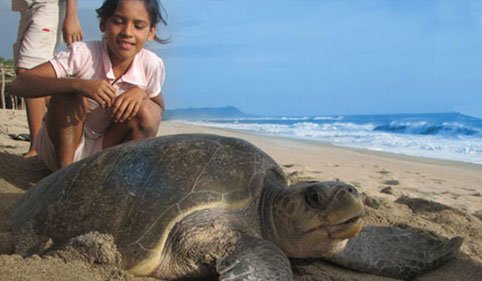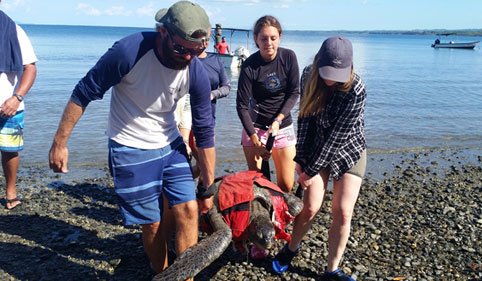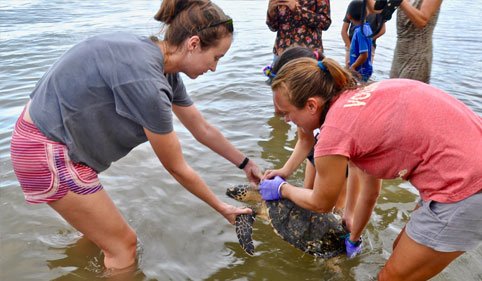Sea Turtle Conservation Mexico
Have you always dreamt of saving endangered species and never got the opportunity to do so? Volunteer in Sea Turtle Project in Mexico and make your dream come true by working in a project has been assiduously trying to conserve sea turtles for over 2 decades.
Located on the Pacific Coast of Mexico on the beaches of Cabo Corrientes, Jalisco, the project began in 2005. It was started by local fishermen after they had personally witnessed dramatic decline in the number of nesting turtles on their beach over the years.
The fishermen tell of the days when mass nesting sessions took place, with thousands of Olive Ridley turtles laying eggs on the beach in one night. There were almost as many people there to collect the eggs and sell them to market!
Sea turtle species are endangered and protected by law; however, thousands of turtles are still slaughtered every year for their meat and eggs, often being cut open for the eggs and tossed back into the ocean. Thousands more die each year in illegal trawl nets and from the construction of homes and resorts on nesting beaches. The fishermen and visiting volunteers save approximately 4,000 nests each year. This effort needs to continue to maintain and hopefully increase population numbers in the future.
The project's goal is to safeguard four types of sea turtles: Olive Ridley (Lepidochelys olivacea), Black/Pacific Green (Chelonia mydas), Hawksbill (Eretmochelys imbricata), and Leatherback (Dermochelys coriacea). The nesting season lasts from May to February of the next year, but the camp operates continuously throughout the year. The project is entirely funded by the contributions of students and volunteers who want to learn more about protecting the environment.
Upon joining this program, you'll receive the necessary tools to learn about sea turtle fieldwork biology. These tools are provided through educational and hands-on workshops, where you actively participate in environmental protection efforts. Patrolling the 12 km beach and relocating sea turtle nests are daily tasks at the camp.
However, our program offers a wide range of activities for you, including reforestation of timber and mangrove trees in the region, collecting, separating, and recycling plastic waste, as well as engaging in interactive activities such as hiking local trails to explore different types of plants and animals, bird watching, tracking mammals, and observing marine life like whales, dolphins, and turtles in their natural habitat.
Take a minute to complete the form and we will be in touch.
Volunteer Responsibilities & Impact
Volunteers will engage in hands-on experiences focused on sea turtle conservation and environmental protection, which include:
- Conducting beach patrols during nights and early mornings to observe nesting females or their tracks and collect and relocate nests.
- Monitoring the incubation process at hatcheries, which involves nest cleaning after hatching and collecting data.
- Participating in daily hatchling releases for most of the year.
- Assisting with activities at camp facilities, such as gardening, cleaning green areas, and construction projects like creating botanical nurseries and pens for the hatchery.
- Engaging in activities at CEAM (Mayto’s Centre for Environmental Education), including workshops on plastic recycling and permaculture.
- Participating in beach cleanups and community care activities.
- In addition to these responsibilities, volunteers may also have the opportunity to support scientific research activities. They can join open water excursions to observe sea turtles in their ocean habitats and other marine fauna like dolphins and humpback whales. Volunteers may also take part in hiking trails and visits to local places of interest, such as other beaches and a lighthouse.
Skills and Qualifications:
This project is ideal for volunteers studying or interested in biological sciences and/or community development, as well as anyone with a general interest in nature and the environment. No previous training is needed, as on-site training will be given upon arrival to the camp. Basic Spanish skills may be helpful for communication with the locals, but not necessary in order to take part in the project.
Take a minute to complete the form and we will be in touch.
Other Important Information :
The nesting season runs from May to February the following year, however camp operations are ongoing year-round. The nesting season officially begins in June of each year. However, nesting numbers begin to show a rapid increase from August onwards. During the months of August through February, there is an immense amount of work to be done at the camp, due to the high numbers of nesting turtles followed by the rapid increase in hatchling activity.
From March through July, work is underway in preparing for the following nesting season, as well as improvements to the camp itself, other wildlife monitoring projects and fundraising. This project may be combined with an intensive Spanish course (based in Melaque, before arriving at camp), as well as weekend breaks to local tourist destinations and tours to some of Mexico's highlights.
Sea Turtle Project: Dates and Fees
The turtle conservation volunteer program starts on each Monday and available between May to September. Please keep your arrival day on Sunday.
We ask that all volunteers ensure to communicate their arrival and departure plans clearly to their country coordinator to ensure transportation and accommodations are properly arranged.
Our Fees:
Since 2006, IFRE has been the most trusted and respected volunteer abroad organization in the world, and also the most affordable. We’re dedicated to providing the highest quality volunteer programs at the lowest fees, which make it possible for everyone, especially students, to volunteer internationally and make a positive impact in the lives of others. We believe in 100% transparency. Rest assured; we never use middlemen. Your one-time registration fee of $299 covers our administrative costs.
The low weekly fee is paid in the host country directly to your host family and project (via country coordinator), and includes housing, food, and minor expenses. IFRE is a non-profit organization, so your program fees are tax deductible.
Volunteer Program Fee (US$)
| Weeks | Sea turtle conservation |
|---|---|
| 1 Week | $420 |
| 2 Weeks | $750 |
| 3 Weeks | $1080 |
| 4 Weeks | $1,410 |
| 5 Weeks | $1,575 |
| 6 Weeks | $1,875 |
| 7 Weeks | $2,175 |
| 8 Weeks | $2,475 |
| 9 Weeks | $2,775 |
| 10 Weeks | $3,075 |
| 11 Weeks | $3,375 |
| 12 Weeks | $3,675 |
The cost for airport pickup is $110 for a one-way trip, while both pickup and drop-off services are available for $195.
Program Fees Cover:
- Complete weekly meals (breakfast, lunch and dinner)
- Night patrols on ATVs to collect nests and sight female turtles
- Biological and ecological workshops regarding all aspects of conservation (local fauna and flora)
- Daily Hatchling release into the ocean when on camp
- Full use of camp facilities and services (kitchen, bathrooms, showers, dining room, palapas and sport areas)
- Open water excursions
- Local hikes depending on the excursion, as well as transportation by bus and boats
- Tent and sleeping bag for accommodation
- Official volunteer t-shirt
Program Fees Exclude:
- Airfare
- Personal expenses
- Tips
- International Travel Insurance
Accomodation and Meal
Accommodation will be provided through camping on the project site, which includes protected areas with shade. All volunteers will have access to camp facilities, including bathrooms with toilets and showers, a kitchen, and recreational areas. To avoid additional fees on flights, a tent and sleeping bag will be provided. Hammocks are also highly recommended for relaxation and comfort.
Complete weekly meals, including breakfast, lunch, and dinner, are provided. As the project emphasizes community involvement, all volunteers are expected to assist with kitchen activities.
Take a minute to complete the form and we will be in touch.
Sea Turtle Conservation: FAQs:
Please provide a typical day schedule for this project.
Volunteers work during the night patrolling the beach and then participate in activities around the campsite in the afternoon.
Where would I be placed? Where is the project located?
The project is close to a small village called La Cumbre in the district of Tomatlán, Jalisco State.
Which airport do I need to arrive for this project? How far is the project from the airport I would be arriving?
Puerto Vallarta Airport – the camp is approximately 2 ½ hour’s drive from the airport.
How will I be transported to the project site?
Transfer is available with a cost of $110USD. Volunteers may also take a bus from Puerto Vallarta to La Cumbre and a taxi to the dock to meet with the biologist. When volunteers arrive after 1pm, transfer to the camp is usually the following day, so accommodations would need to be booked for one night in Bucerías or Puerto Vallarta (please speak with coordinator before booking flights and accommodations).
What are the activities involved at this project?
Volunteers work during the night patrolling the beach on foot or on an ATV to collect the nests laid by the sea turtles and relocate them to a protected area close to the camp, as well as collecting and releasing hatchlings during the night. Volunteers will generally sleep late and participate in activities around the camp in the afternoon such as cleaning, cooking and cleaning the beach. Aside from working with the sea turtles, volunteers may have the opportunity to take part in a crocodile population survey – this includes boat rides during the night with the biologist to count crocs. Timetables change as volunteers work on shifts, so some nights they may patrol on an early shift and some nights the second shift.
Will I be handling the project on my own or will there be someone assisting me while working?
You will be working alongside the biologist based at the project.
Do I need to bring any material?
Volunteers receive placement details, which outlines equipment list, including sleeping bag/liner, travel pillow, insect repellent and toiletries as well as the appropriate clothing for the time of the year.
Is this project available all-round the year? If not, when does it close for how long?
This placement is available from July through February (nesting season for the Olive Ridley Sea Turtle).
How safe is this project is?
Volunteers are always supervised by the local biologist and there have never been any problems at the camp. However, please take into account that volunteers are in an isolated environment and must follow basic safety rules such as wearing shoes at all times, not swimming in the open ocean and not swimming in the lagoon after dark.
Any important information you want to share about this project.
The sea turtle conservation project is run by a local fisherman’s cooperative and is the only project managed by the local community in our area. Volunteers will be interacting with the fishermen during their stay, a great chance to learn/improve Spanish.
Other Volunteer Programs in Mexico
There are many ways for you to make a difference in Mexico with IFRE. Such as:
Contact IFRE today to learn more.
Take a minute to complete the form and we will be in touch.




